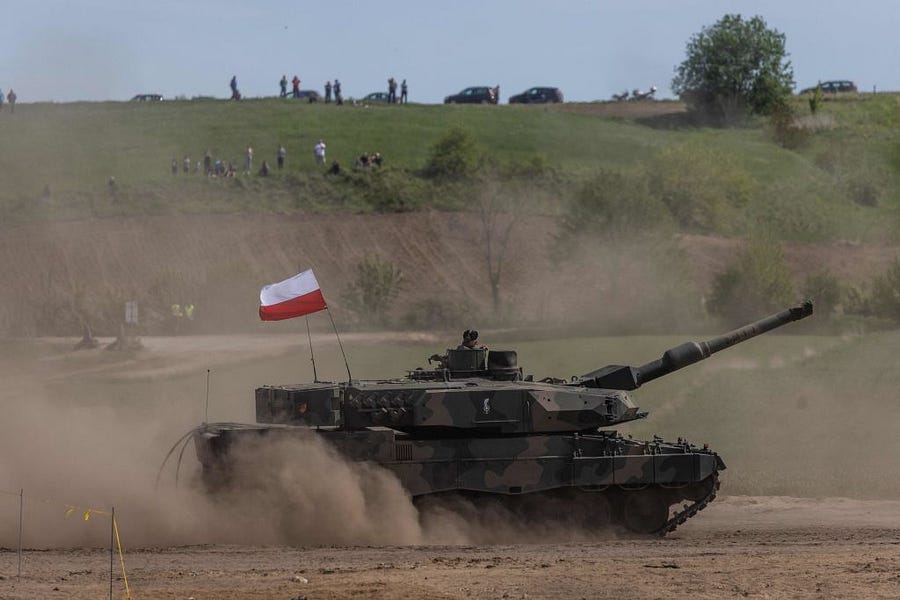WARSAW—Before Russian tanks rolled into Ukraine this February, Vladimir Putin demanded that NATO troops withdraw from Poland and the Baltic states. This extortion attempt has gone as well as the broader invasion: NATO states responded by rushing troops and equipment eastward while making major military spending commitments.
“We understand our geostrategic location,” Gen. Rajmund Andrzejczak, chief of the General Staff of the Polish Armed Forces, said at the Warsaw Security Forum this week. “We have no time and no space. We are frontline.”
Poland, a country of 38 million, shares borders with Russia and the Russian vassal Belarus, along with Ukraine. The former Soviet satellite state, which joined NATO in 1999, serves as a staging area for Western support to Kyiv. Poland also houses some 2 million Ukrainian refugees.
Polish officials, along with their Baltic neighbors, have long argued that Russia’s imperial ambitions extend far beyond Ukraine. For years many Western European leaders dismissed such warnings as alarmist. The invasion changed everything.
NATO commanders reinforced eastern allies with fighter jets, air defense systems, warships, and troops. Warsaw has brought up deploying American nuclear weapons on its territory, though that remains unlikely for now. While Poland has benefited from the recent buildup—there are some 10,000 U.S. military personnel currently stationed in the country—the help hasn’t made the country complacent.
Last year Poland spent around 2.3 percent of gross domestic product on defense, the third largest share of any NATO ally. In March lawmakers approved legislation to raise defense spending to 3 percent of GDP in 2023. Polish leaders now speak of hitting 5 percent in the coming years.
While the gutted Russian military is no conventional threat to Poland today, officials in Warsaw see a long-term, land-based menace and are planning accordingly. The government recently signed contracts to purchase about 1,300 American and Korean-made tanks. By 2030, Poland could oversee a larger tank force than the United Kingdom, Germany, France, Italy, Belgium, and the Netherlands—combined.
This kind of military heft brings influence at NATO summits. While the U.S. has traditionally seen France and Germany as the pillars of continental defense, Poland has made a case for a bigger role.
Consider Germany, a defense spending laggard with a consequently dilapidated military. German lawmakers amended the country’s constitution to approve $107 billion in special military spending over the summer but are still projected to fall short of the 2 percent goal for NATO member states.
Perhaps more important, the country has received significant criticism from NATO allies over its uneven support for Ukraine. Before the invasion, German officials offered to send the country 5,000 helmets. Today Germany is being criticized for declining to supply Ukrainian forces with battle tanks for their counteroffensives. German Chancellor Olaf Scholz, like French President Emmanuel Macron, has tempered the scale and variety of his country’s military assistance to Ukraine.
Meanwhile, Poland has become Ukraine’s second biggest military supplier behind the United States, providing Kyiv with $1.8 billion in military in-kind aid between late January and early August. “If Ukraine were dependent on Germany within the framework of a European defense policy,” the Polish prime minister said in a recent interview with Der Spiegel, “it would no longer exist today.”
German and French rhetoric, which often harped on not humiliating Putin and avoiding escalation, has become more in line with Polish and American sentiment. Foreign Minister Annalena Baerbock recently acknowledged that “Germany did not listen carefully enough to the right assessment of many partners with regard to Russia.” Whether the country takes concrete action is another question.
“In so many ways, Poland leads the way when it comes to dealing with Russia and when it comes to European security,” said Jim Townsend, former U.S. deputy assistant secretary of defense for Europe and NATO. “History dies hard. The Poles remember being carved up between Germany and the Soviet Union. They remember the Cold War.”
Historical memory makes Poland a potent opponent of Russia but also can damage its relations with allies. Poland’s foreign ministry recently requested World War II reparations of $1.3 trillion from Germany, which outright rejected the demand. This was only the latest political spat between Poland’s conservative ruling coalition and its larger neighbor.
“That hurts them in terms of their gravitas at NATO,” Townsend added. “They’re seen as an upstart that’s always stirring the pot.”
Poland also got off to a rough start with President Joe Biden. In May 2021 he lifted sanctions on Nord Stream 2, a new gas pipeline that would have deepened German dependence on Russia. Poland, which had begun weaning itself off Russian energy years ago, warned that Putin would use its energy supply as leverage over Europe but was ignored.
Russia’s invasion reversed any lingering ill-will between Poland and the U.S., which have worked shoulder to shoulder to provide Ukraine with military, humanitarian, and logistical support. The question is whether the Biden administration will fully embrace the potential of Poland, which is one of NATO’s most enthusiastic members.
Ninety-one percent of Poles describe NATO as somewhat or very important, a recent survey by the German Marshall Fund found. While the presence of U.S. troops is controversial in some European countries, most Poles see the deployments as a welcome deterrent and proof the U.S. is committed to collective security.
“U.S. leadership is of paramount importance in this process,” Polish Defense Minister Mariusz Błaszczak said from Warsaw. “NATO is essential to provide deterrence for those who are particularly engaged in support for Ukraine and are most exposed, by its geography or commitment to the Russian and Belarusian threat.”







Please note that we at The Dispatch hold ourselves, our work, and our commenters to a higher standard than other places on the internet. We welcome comments that foster genuine debate or discussion—including comments critical of us or our work—but responses that include ad hominem attacks on fellow Dispatch members or are intended to stoke fear and anger may be moderated.
With your membership, you only have the ability to comment on The Morning Dispatch articles. Consider upgrading to join the conversation everywhere.